One teen’s reflection:
Like many other black teens, being followed through a store, questioned about my intelligence, and constantly hearing stereotypes that do not reflect me have had an impact on my relationship and conceptions with law enforcement, along with the systematic ways that seemingly benefit those of white descent.
Yet, not all law enforcement is bad, just like not all law enforcement is good. “How can law enforcement and civilians interact better together and de-escalate possible conflict?”
There can be many perspectives on this overall topic, as there is a huge disparity between all ages of African Americans and white people who are incarcerated. This trend is illustrated by a 2016 report “The Color of Justice” by the nonprofit The Sentencing Project that reported “African Americans are incarcerated in state prisons at a rate that is 5.1 times the imprisonment of whites.” The organization also determined that more than 60 percent of people in U.S. prisons are people of color. In Georgia, black youth are “held in placement” five and one-half times more frequently than white youth, according a September 2017 report by The Sentencing Project.
After interviewing 20 Atlanta teens, one legal advocate, four youth advocates, one lawyer, and one person with experience of being incarcerated for resisting arrest, we noticed two main themes: racial disparities in incarceration rates and the miseducation of teens. But, as a metro-Atlanta teen today, it bothers me when thinking: Is it really always possible for teens of all ethnic backgrounds to de-escalate situations with law enforcements, possibly avoiding arrest?
Some teens may not be judged on their actions but instead by their marginalized characteristics that label them with misconceptions and stereotypes. “Obviously, you should teach people how not to get killed, but I also think that the fact that I’m saying ‘how not to get killed,’ it’s literally sometimes futile,” said Nia Duncan, age 20, who graduated from Booker T. Washington High School and is now a youth advocate with the nonprofit Georgia EmpowerMEnt. “If you look at this from the intersection of race and class, you can tell someone…to be calm, literally lay down on the floor, be defenseless… But that may not work … because your blackness may already be inherently criminalized by the person you’re interacting with.”
The fact that most teens we spoke to (ages 14-17) are unaware of their rights when dealing with law enforcement is a clear reason why teens and children should be taught more about the law. The same value that is given to buying the newest Apple product, watching season two of a popular show and even decisions regarding college should be given to educating kids at home and at school about the law and its importance.
As teens, while we may not be taught this in school anytime soon, it may be up to us to learn it on our own, for our own safety. Nineteen of the 20 teens we interviewed said they didn’t know about the criminal justice system, even though 18 of them had family or friends that have dealt with law enforcement and two had family members incarcerated for long periods of time.
One 15-year old we spoke with was arrested in February for resisting arrest from a police officer.
“I guess money equals power, so wherever you live or your demographic means a lot,” said 15-year-old Emma, who we interviewed in Atlanta’s Centennial Olympic Park.
In an interview with VOX Media Cafe reporters, Randee J. Waldman, the director of Barton Juvenile Defender Clinic at Atlanta’s Emory University School of Law made a very impactful point: “It is normal for teenagers to do thing that will get the into trouble. Some teenagers need to change their behavior, but also the adults in the system need to change their behavior and understand these are not things that we should be personally punishing kids for doing, because they’re ‘normal things.’”
So, I realized this really deeper, deeper than some actions made by those that are incarcerated. Economic class, ethnicity, and leverage can all affect how the legal system reacts to different people from different backgrounds or skin color while being charged with the same crime.
It is important for teens to educate themselves on their rights and the correct way to handle situations with law enforcement to help de-escalate the ignorance that is sometimes shown through law enforcement. How can you prepare for this contact?
“Should teens not fight back when police stop them at a red light? Absolutely,” said the Waldman, who represents kids in court. “You need to act responsibly, respectfully. You need to obey the commands of the law enforcement officers, but … if you run a red light you shouldn’t end up in jail.”
“You should give your name if the police ask because the law requires you to do so, but that does not mean the officers can mistreat anyone. “The response to that [should be] to de-escalate situations. All too often officers are trained to escalate and not de-escalate situations.”
After interviews, conversations, and discussions about this overall topic, my take away and suggestions are:
- Realize that they are authority and respect them at all times.
- Let them know that you post no threat towards them
- Review your rights by memorizing the first Ten Amendments in the U.S. Constitution’s Bill of Rights, so you can know the best way to relate them to any incident at all times.
As writer Victor Hugo once remarked, “Education is the fundamental way to prevent incarceration, as “he who opens a school door, closes a prison.”
Writing by Ramaya Thomas, 14, a rising 9th grader at Atlanta International School who is passionate about speaking out about things that impact her communities.
Video produced by Rafi Davinsky, Ryann Richards, Ramaya Thomas and Demetrius Whitaker.




